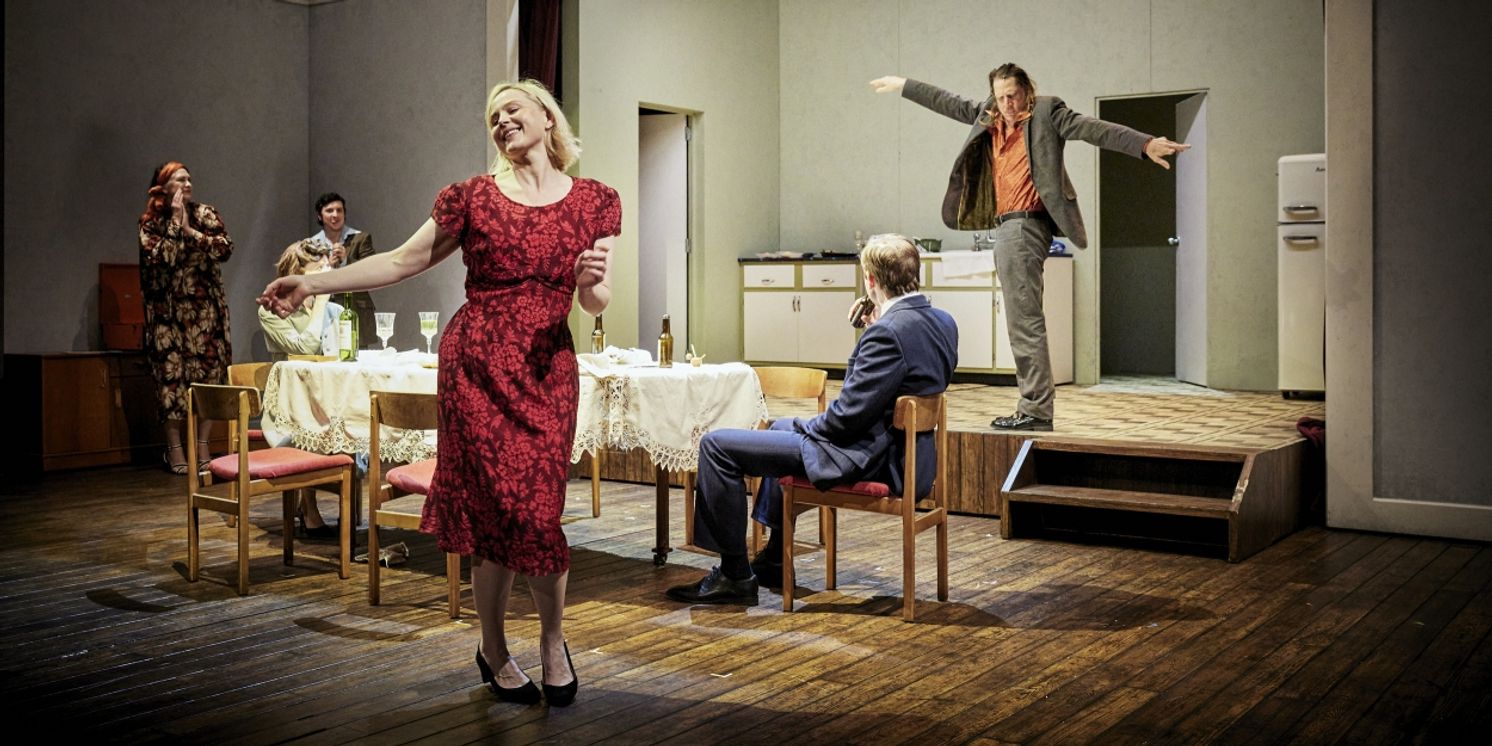Review: THE CONFESSIONS, National Theatre
Alexander Zeldin tells the story of his own mother and says something personal to all of us

 Alexander Zeldin makes theatre like nobody else, as he proved on this stage with his Inequalities trilogy of plays that excavated the despair, and the hope, amongst the left-behind, the people so cynically and so cruelly sold the canard of “levelling-up”, an election or two ago.
Alexander Zeldin makes theatre like nobody else, as he proved on this stage with his Inequalities trilogy of plays that excavated the despair, and the hope, amongst the left-behind, the people so cynically and so cruelly sold the canard of “levelling-up”, an election or two ago.
This time he turns his eye for capturing the rhythms of messy lives on to his own mother whose journey (literally) from Australia to the UK stands as both a deeply personal testimony and a reminder of the redemptive quality of migration in a world that seeks to tarnish that human impulse with problems, often tinged with the sourest tang of racism. That the play itself is touring Europe and beyond adds a meta-layering to the production, another example of how hearts can open in different environments.
With the house lights up, a woman, advanced in years, addresses us from the front of the stage - immediately enrolling us into the story of her life. She pulls back the curtain, physically and metaphorically, and we’re pitched into 1950s Australia, schoolgirls giggling at a prom, sailor boys chasing them. One is Alice, whose 2020s self we have already met, and one of the boys is Graham, who, in Alice’s mother’s eyes at least, offers her daughter the security she needs. She listens to her bullying mother and not her gentle father - as nice kids often do.
(1).jpg?format=auto&width=1400)
In a series of episodic scenes, each a decade or so apart, we track Alice’s dreams as they hatch, are dashed and then come back, reshaped, but just as strongly held. En route, she learns, sometimes the hard way (one time the very hardest way) to be true to herself, to identify false friends who can come in many guises and, in a poignant callback to an earlier conversation with Graham, take control of her own fertility, create a family and back herself to deal with the consequences.
Alice is played by two women, Amelda Brown as the older version, a narrator and observer and, in a crucial and deeply affecting scene, the instigator of the sweetest of revenges. Eryn Jean Norvill is the younger Alice, capturing insecurity and subservience in Australia’s profoundly patriarchal society before slowly, through the power of art and the acquisition of imperfect friends who, nevertheless, believed in her as much as her passive father, finds her feet on shifting sands.
As an aside, my son (26) found the life too ordinary - and many young people will - but the perspective of age reveals chips away at that superficial reading and we see plenty of our own lives refracted in Alice’s.
Her life, naturally, takes place in the wider context of social change. I caught a little of the inferiority complex so prevalent in suburban Australia in the 50s, that was chronicled in their own styles by Clive James and Barry Humphries (like Alice, deeply interested in art and travellers to Europe as soon as they could). There’s the strident 70s feminism of Germaine Greer raising its head - Susan Brownmiller more accurately, I think - and a university tutor straight out of the Howard Kirk book of entitlement (two in fact, but one genuinely evil). And there’s the bumping into the right person that can happen in a big cosmopolitan city like London and, with it, the realisation that kindness and decency are the most underrated of traits.
The support cast multi-role even doing a bit re-setting (as in Brecht, everything is on show all the time, a jarring reminder that, for all the immediacy and intimacy of story, we’re in a theatre, with the lights up more often than not). Joe Bannister has the unenviable task of playing two monsters, Graham and Terry, a smug university lecturer who, like one or two other studies, topples a little too readily into caricature. Jerry Killick plays two characters not quite as bad as those two, but cut from the same cloth - a boganish neighbour and a university tutor with his heart, if not always his penis, in the right place.
Brian Lipson has the trickiest gig in portraying Jacob, the man Alice meets in London with him aged 55 and her 42. We have to believe that this quiet man, whose steel was acquired as a holocaust survivor, can pull all the strings of Alice’s psychodrama together and create the redemption she so deserves - and he does. Without that resolution (and the playwright himself popping up as a very amusing bolshie teen), the heartwarming conclusion wouldn’t send us into the night happy.
Almost two hours with no interval, inevitably there are flat spots (Pamela Rabe’s lesbian photographer is written and played too broad, like a edgy 80s sitcom character), but the two Alices are never less than wholly engaging. They may not have found themselves in wonderland, but they make the best of things and that's about as much as anyone can ask of themselves.
The Confessions is at The National Theatre until 4 November
Photo Credits: Christophe Raynaud de Lage
Reader Reviews
Videos

